
I would like to introduce you to a wonderful probiotic that I use frequently in my clinic … say hello to Saccharomyces boulardii (pronounced “sack-car-oh-my-sees boo-lard-dee”).
It is officially known as Saccharomyces cerevisiae boulardii since it is a subspecies of the Saccharomyces cerevisiae (baker’s yeast).
Although the various names are daunting, it really is a powerful probiotic that is well tolerated. Saccharomyces boulardii (also referred to as S.boulardii or simply SB for ease) confers a positive health benefit on the host and is very beneficial for overall gut health and function, helping to maintain a healthy balance of good and bad microorganisms.
Unlike its bacterial counterparts, Saccharomyces boulardii is actually a yeast. This strain was isolated from the tropical superfoods, mangosteen (below left), and lychee fruit (below right), in 1923 by the French scientist, Henri Boulard (hence the name).
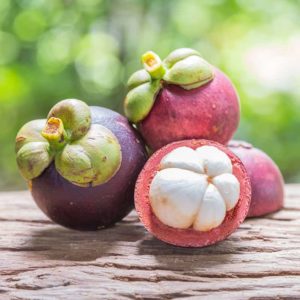
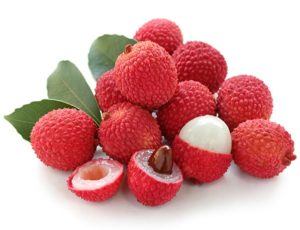
Before you can appreciate this wonderful probiotic and its actions, you will first need a quick anatomy refresher on leaky gut, along with causes and outcomes.
Mechanisms of Leaky Gut
Increased intestinal permeability (commonly known as ‘Leaky Gut’) occurs when the cells lining the gut become damaged and the tight junctions of intestinal walls become loose, resulting in larger particles of undigested food, toxins, and pathogens entering the bloodstream causing inflammation and irritation.
An unhealthy diet, long-term NSAID use, stress, and chronic inflammation are some factors that are believed to contribute to it.
ANATOMY OF THE SMALL INTESTINE

ENLARGED VIEW OF EPITHELIAL CELLS 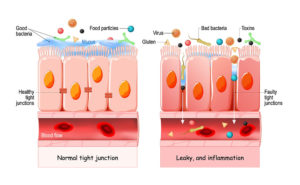
Leaky gut syndrome is often linked to many conditions if left untreated, including many chronic disease states and autoimmune disorders.
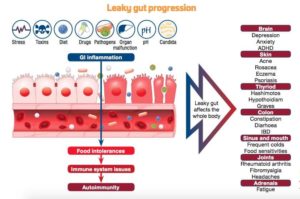
Treatment usually includes lifestyle changes along with:
- eating a healthy diet
- taking probiotics
- limiting alcohol and NSAIDs
- reducing stress
- quitting smoking
How Can Saccharomyces boulardii Help Leaky Gut?
Builds a Better Intestinal Barrier
Problems with the intestinal barrier can be linked to health issues within the GI tract. The digestive system is the first line of defense for the immune system, so having healthy gut flora helps keep harmful bacteria from getting into our bloodstream.
SB can do more than help leaky gut; it can actually heal it. By strengthening the tight junctions between cells, SB strengthens the walls of your intestines and makes them a better barrier against infection. In doing so, immunity improves.
Raises IgA (Immunoglobulin A) Levels
Another way SB heals leaky gut is by raising IgA levels. IgA is an antibody that plays a role in the immune function of mucous membranes. It lines the intestinal tract to protect us from infection. Sometimes, IgA becomes impaired or weakened. SB supplementation has been shown to boost levels of secretory IgA.
Helps Digest Disaccharides
Disaccharides are sugars, such as maltose, lactose, or sucrose, which can be hard to digest when the intestinal tract is not working right. This is because of a lack of disaccharidase, the enzyme needed to process disaccharides, and is often why people struggle to properly digest good carbohydrates, like beans or vegetables. Adding SB to your regimen will help your body produce more of this enzyme and lead to better carbohydrate digestion.
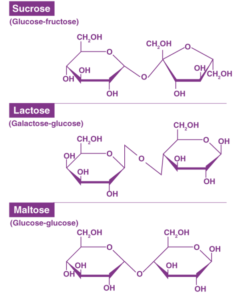
Reduces Gut Inflammation
SB reduces inflammation throughout the intestinal tract. This helps give the cells that line the intestinal tract the chance to repair a leaky gut and rebuild the villi (tiny, hair-like projections) to increase nutrient absorption. When the gut is less inflamed, autoimmune conditions also improve.

Advantages of Saccharomyces Boulardii as a Probiotic
Overall, SB makes an effective probiotic because it creates mannan oligosaccharides (MOS). These are compounds that prevent harmful bacteria from adhering to the intestinal tract and it also inactivates harmful strains of yeast.
Because it’s strong enough to survive stomach acid and protein-digesting enzymes, it’s able to travel to the small and large intestines where it can help. It also is completely safe to take with or instead of bacteria-based probiotics.
It also does not require refrigeration – an added bonus for a busy lifestyle.
What Gastrointestinal Disorders Benefits of Saccharomyces boulardii?
Saccharomyces boulardii (SB) may help treat or prevent certain gastrointestinal disorders.
These include –
-
Diarrhoea
Studies have shown SB is an effective remedy for acute diarrhea in children and adults. This is the short-term diarrhoea that typically lasts for no more than two weeks. SB reduces the frequency and duration of acute diarrhoea. It also ameliorates abdominal pain and shortens the hospital stay in patients with acute infectious diarrhoea
It is of great benefit also in preventing diarrhoea associated with using antibiotics in both children and adults and can be taken whilst completing a course, with no need to separate the dose from the antibiotic.
Taking just one 500 mg dose of SB each day while traveling also significantly reduces the risk of traveler’s diarrhoea.
One of the biggest advantages of this probiotic over others is that SB can be easily tossed into your luggage, as it does not need to be refrigerated. Researchers now believe that SB actually helps to promote recovery from diarrhoea by more quickly restoring the intestinal bacteria required for normal bowel functioning.
-
Irritable Bowel Syndrome (IBS)
Irritable Bowel Syndrome (IBS) is a chronic condition that causes very uncomfortable intestinal symptoms. Research has revealed that SB can reduce the pain, cramping, bloating and excessively frequent bowel movements for a large percentage of those with IBS (especially IBS-D, or diarrhoea predominant).
SB has been shown to offer an improved quality of life to IBS-D patients who struggle with troublesome diarrhoea which is very positive.
-
Irritable Bowel Disease (IBD)
Inflammatory Bowel Disease (IBD) primarily consists of Crohn’s Disease and Ulcerative Colitis. Both of these are extremely painful conditions that cause damage to the intestinal tract.
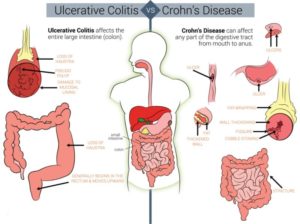
SB acts as an anti-inflammatory agent in the intestinal tract by suppressing pro-inflammatory cytokine production. It has been shown to prevent flares in Crohn’s Disease, as well as excessively frequent bowel movements and intestinal inflammation in Ulcerative Colitis.
This is based on SB improving intestinal permeability, leading to overall gut repair.
-
Bacterial, Parasitic, and Fungal Infections
Clostridium Difficile
Clostridium difficile (C. diff.) is a bacteria that many carry inside their intestinal tract. In a small percentage of children and adults, C. diff. can create dangerous secondary infections which are especially common after receiving antibiotic therapy in the hospital. Since antibiotics can create this infection, it is extremely challenging to treat. Fortunately, SB has been found to reduce rates of C. diff. infections in hospitalized adult and pediatric patients on antibiotics.
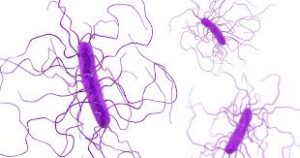
Helicobacter Pylori
Helicobacter pylori (H. pylori) is a bacteria that causes stomach, and sometimes small intestine ulcers. H. pylori has been also linked to stomach cancer in susceptible individuals. SB has been shown to reduce the colonization of H. pylori. SB along with standard triple therapy increased eradication rates and decreased overall therapy-related side effects, particularly diarrhoea.

Blastocystis hominis
Blastocystis hominis (B.hominis) is a microscopic parasite that can live in your digestive tract. Some people experiencing diarrhoea, abdominal pain, or other gastrointestinal problems and food intolerances have B.hominis in their stool.

Candida albicans
The Candida genus of yeasts is very large and includes many different species, although C.albicans is the most common culprit behind human fungal infections.
Candida is a natural resident in our intestinal tract (especially large bowel) and normally our own defense mechanisms keep it in check. However, stress, illness, medications such as antibiotics, and a high intake of sugary foods can create conditions favourable for the yeast to proliferate.
SB is itself a yeast, but one with probiotic potential which has displayed anti-Candida properties in relevant research studies. SB has been shown to inhibit populations of Candida and deter them from establishing in the small intestines, and it’s also suggested that SB may help to reduce the risk of Candida yeasts translocating from the digestive tract.
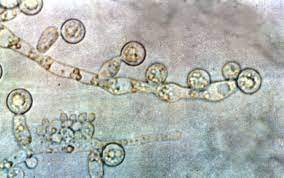
It’s thought that these effects occur because SB produces caprylic acid, an antifungal substance that is effective against Candida yeasts.
SB has also been shown to reduce the potential for Candida adhesion in patients with IBD and reduces possible cytokine-mediated inflammatory host response.
Safety
S.boulardii is safe for use in otherwise healthy individuals. That being said, if you are ill or if you have a suppressed immune system, we strongly recommend talking to your practitioner before using any probiotics.
CLICK HERE to book a consult online.
**If you’ve got this far – thank you for reading and I look forward to bringing you more information in the future.
